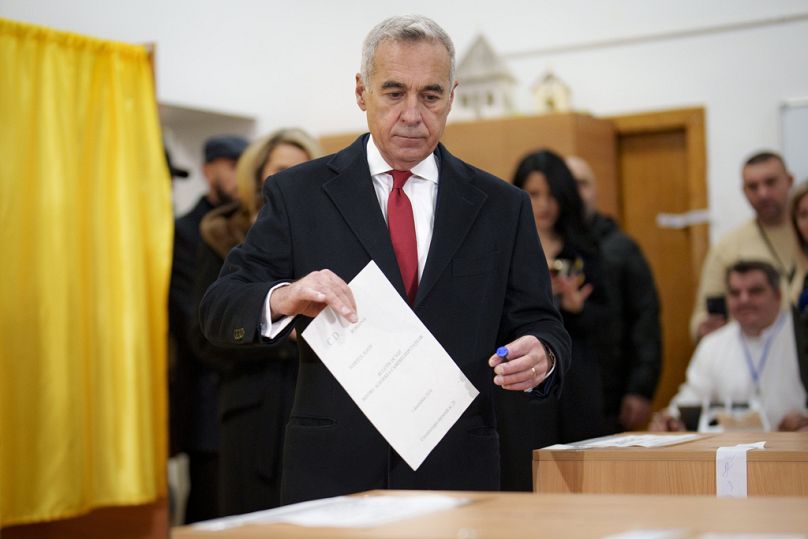The vote comes just one week after a highly controversial first round of the presidential race, which saw relatively unknown populist candidate Călin Georgescu win 23% of the vote.
Romanians were voting on Sunday in a parliamentary election sandwiched between a two-round presidential race - the first of which has plunged the European Union and NATO member into unprecedented turmoil following allegations of electoral violations and Russian interference.
The election will usher in a new government and prime minister and determine the formation of the 466-seat legislature. Romanians living abroad were able to vote since Saturday. By 1 p.m., nearly 4.2 million people — about 23% of eligible voters — had cast ballots, according to the Central Election Bureau.
The legislative vote comes a week after the first round of a presidential race that saw a controversial far-right populist who was polling in single digits win the most votes. Calin Georgescu, 62, is due to face reformist Elena Lasconi of the Save Romania Union party, or USR, in a Dec. 8 runoff.
Georgescu’s success, which many have attributed to his rapid rise in popularity on the social media platform TikTok, has triggered nightly protests throughout Romania by those who oppose his past remarks praising Romanian fascist leaders and Russian President Vladimir Putin and view him as a threat to democracy.
Many observers believe the presidential outcome indicates a sharp shift from Romania’s mainstream parties to more populist anti-establishment parties, whose voices have found fertile ground amid high inflation, high cost of living and a sluggish economy.
Alexandru Rizescu, a 24-year-old medical student, says he was surprised by the result in the first-round presidential ballot and that it’s an “obvious sign” Europe at large is shifting toward far-right populism.
“Most of us are sick of these big parties, but now we have to think about the lesser evil,” he said. “If Georgescu becomes president, with a favourable parliament, it’s going to be wild.”
According to a report by Expert Forum, a Bucharest-based think tank, Georgescu’s TikTok account before last week's vote saw an explosion of engagement, which it said appeared "sudden and artificial, similar to his polling results.”
Without naming Georgescu, who declared zero campaign spending, Romania’s top defence body said on Thursday that “a presidential candidate benefited from massive exposure due to preferential treatment” granted by TikTok. Romania has become a “priority target for hostile actions” by Russia, it added. The Kremlin denies it is meddling.
The same day, the Constitutional Court requested a recount of all 9.4 million votes after a presidential candidate who obtained 1% filed a complaint alleging the USR had violated electoral laws against campaign activities on polling day. The Central Election Bureau approved the request and said scanned reports were due to be sent in by Sunday night. On Friday, the court postponed a decision until Monday on whether to annul the vote.
And the European Commission has also requested information from YouTube, Snapchat and TikTok.
Cristian Andrei, a political consultant based in Bucharest, predicted the general election could also be reshaped by Georgescu's success, with far-right parties possibly obtaining record highs.
“The impact of the surprise in last Sunday’s presidential election will be significant, and we are going to wake up in a new political reality,” he told The Associated Press. “Georgescu voters will speak again and will reshape how we look at the political Romanian spectrum from now on and probably forever.”
“The most probable scenario will be a difficult-to-build majority in the parliament to support and endorse a new government,” he added.
Romania's two main opposition parties, the Social Democratic Party, PSD, and the National Liberal Party, PNL, formed an unlikely coalition in 2021, which has become increasingly strained. A small ethnic Hungarian party exited the Cabinet last year after a power-sharing dispute.
After casting his ballot on Sunday, incumbent Prime Minister Marcel Ciolacu told the media that Romanians “have to choose between stability and chaos.”
“Today is a very important day for all of us Romanians to stay on our European and North Atlantic path,” he said. “This is the most important choice we have to make today.”
Georgescu told the media on Sunday that he voted “so the good prevails over evil.”
“I voted for peace, not for war, for respect, for total political responsibility, dedicated totally to Romanian people,” he said. “I voted for Romania, along with Romania, forever for Romania.”
While the presidential role in Romania has significant decision-making powers in areas such as national security and foreign policy, the prime minister is the head of the nation’s government.
Recent surveys have suggested the top three parties in Sunday’s race will be the PSD, the far-right Alliance for the Unity of Romanians and the PNL. After rising to the political scene eight years ago on an anti-corruption ticket, the USR’s popularity has diminished in recent years, but could garner the next most votes.
More minor parties that may not pass the 5% threshold to enter parliament include the pro-EU reformist REPER party and the liberal-conservative Force of the Right. Some have predicted that the far-right nationalist S.O.S Romania party, and the recently formed and little-known Party of Young People, which has backed Georgescu, could pass the threshold.
Silviu Safta, a retail manager in Bucharest, said that Georgescu topping the polls was “a surprise for everyone, except for the two million people that voted for him," and that he's sceptical whether Sunday's parliamentary vote will follow the same populist tilt.
“I think Romanians will be more informed about their elections and ... their candidates,” he said. “I’m a little bit sceptical about the results, but I hope that democracy will win.”












